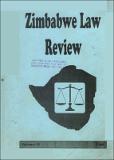| dc.contributor.author | Ncube, Welshman | |
| dc.coverage.spatial | Zimbabwe. | en |
| dc.date.accessioned | 2015-08-26T13:34:54Z | |
| dc.date.available | 2015-08-26T13:34:54Z | |
| dc.date.issued | 1996 | |
| dc.identifier.citation | Ncube, W. (1996) The Right to Information and the Regulation of Broadcasting in Zimbabwe: Towards a More Liberal Framework. Zimbabwe Law Review (ZLRev), vol. 13, (pp. 139-151). UZ, Mt. Pleasant, Harare: Faculty of Law (UZ). | en |
| dc.identifier.uri | https://opendocs.ids.ac.uk/opendocs/handle/20.500.12413/6855 | |
| dc.description | A ZLRev article on the right to information in Zimbabwe from a legalistic perspective. | en |
| dc.description.abstract | The debate over the broadcasting legal regulatory framework in Zimbabwe falls within the general discourse on freedom of expression, information and the media. Accordingly, issues relating to the reform of the laws governing broadcasting have to be discussed within the general context of the rights to freedom of expression, access to information and freedom of the media. Within this context important constitutional and human rights imperatives arise which have to be reviewed so as to properly understand the issues which are crucial in the process of regulating broadcasting and broadcasting services. Broadcasting does not and cannot take place in a vacuum. It is not and cannot be a purposeless exercise without social ends. The essence of broadcasting includes or encompasses the obligation to inform, the right of citizens to be informed, their right to acquire knowledge and information, their right to entertainment and recreation and indeed their right to be educated. It is for this reason that broadcasting is an important social and political issue which ought to concern all those who believe in democratic government. This paper is divided into four parts of which this introduction is the first. The second part discusses the importance of free speech and freedom of information to individual self realisation and to the institution and maintenance of democratic and accountable government. The third part discusses the scope of the right to free speech within the context of international human rights instruments. The fourth part discusses the recognition and implementation of the right in Zimbabwe and also analyses the broadcasting laws within the context of the Constitution. The fifth and final part suggests recommendations to create a more liberal legal regulatory framework for broadcasting. | en |
| dc.language.iso | en | en |
| dc.publisher | Faculty of Law, University of Zimbabwe (UZ) | en |
| dc.rights.uri | http://creativecommons.org/licenses/by-nc-nd/3.0/ | en |
| dc.subject | Rights | en |
| dc.title | The Right to Information and the Regulation of Broadcasting in Zimbabwe: Towards a More Liberal Framework | en |
| dc.type | Article | en |
| dc.rights.holder | University of Zimbabwe (UZ) | en |


